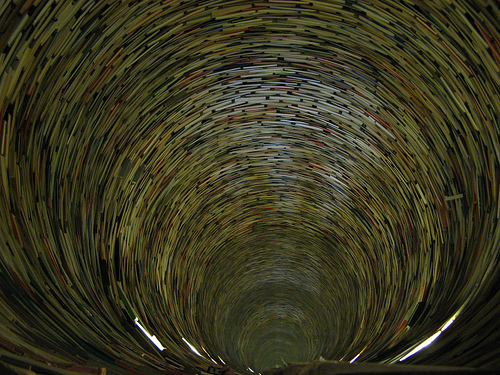Moving Towards a Physical Archive of the World’s Books

Via The Atlantic
The Internet Archive, a non-profit digital library with the Wikipedian mission of “universal access to all knowledge,” has offered free storage and access to digitized music, movies, websites and nearly three million public domain books since 1996. In May, the Archive turned its focus offline, towards the preservation of physical reading materials. The aptly-named Physical Archive to the Internet Archive, a prototype facility devoted to the long-term preservation of physical records, launched last Sunday in Richmond, California. Materials are stored in 40-foot shipping containers, modified for secure and individually controllable environments of 50 or 60 degrees Fahrenheit and 30 percent relative humidity and designed to keep out undesirable pests.On the Internet Archive’s blog, founder Brewster Kahle compares the Physical Archive to the Svalbard Global Seed Vault as “an authoritative and safe version of crops we are growing.” Saving physical copies of digitized books might at least be seen in a similar light as an authoritative and safe copy that may be called upon in the future:Digital technologies are changing both how library materials are accessed and increasingly how library materials are preserved. After the Internet Archive digitizes a book from a library in order to provide free public access to people world-wide, these books go back on the shelves of the library. We noticed an increasing number of books from these libraries moving books to “off site repositories” (1 2 3 4) to make space in central buildings for more meeting spaces and work spaces. These repositories have filled quickly and sometimes prompt the de-accessioning of books. A library that would prefer to not be named was found to be thinning their collections and throwing out books based on what had been digitized by Google. While we understand the need to manage physical holdings, we believe this should be done thoughtfully and well.Two of the corporations involved in major book scanning have sawed off the bindings of modern books to speed the digitizing process. Many have a negative visceral reaction to the “butchering” of books, but is this a reasonable reaction?Kahle’s comparison to the Svalbard Seed Bank may be more indicative of the Physical Archive’s real utility. While concentrated server farms may be better homes to the digitized sum of the world’s cultural and literary knowledge than libraries to their physical counterparts, a single phenomenon — an electromagnetic surge in the earth’s atmosphere, a terrorist attack, a natural disaster or even a spilt coffee cup — could instantly hasten the evaporation of our literary cloud.









